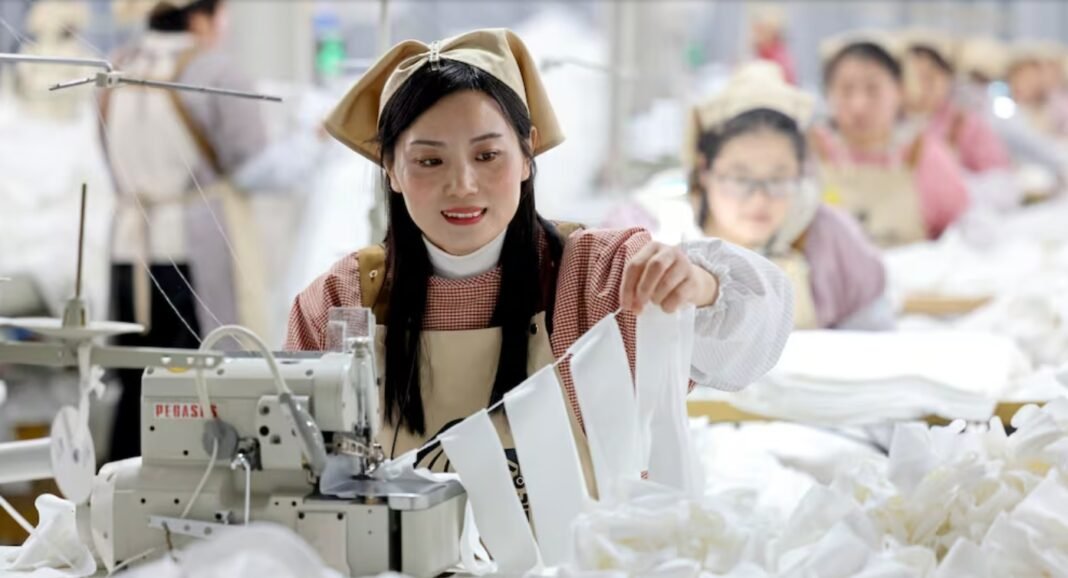As tensions rise in America’s escalating trade war, some have viewed it as an opportunity to curb the overconsumption of cheap goods. The logic is straightforward: by increasing tariffs and restricting the flow of inexpensive imports, the theory goes, consumers will be forced to reconsider their spending habits and possibly even turn to more sustainable, ethically made products. However, Kenneth P. Pucker argues that, rather than leading to a much-needed transformation of the fashion industry, the economic hardship brought about by these trade policies will likely undermine efforts to make the industry more responsible and sustainable.
The trade war, particularly with China, has already resulted in a significant increase in tariffs on a wide array of consumer goods, including apparel. As a result, companies have been faced with higher production costs and, in many cases, the need to pass these increased expenses onto consumers. While this might seem like a win for those hoping to reduce demand for mass-produced, low-quality goods, the reality is far more complex.
The Consequences for Sustainability
One of the key arguments against cheap, mass-produced goods is their environmental impact. Fast fashion, for instance, has been a major driver of unsustainable production practices, contributing to resource depletion, pollution, and unethical labor conditions. Many advocates for change have called for a shift towards more sustainable practices, such as the use of eco-friendly materials, fair labor standards, and better waste management.
However, the escalating trade war threatens to derail these efforts. As tariffs increase, consumers will be forced to pay more for goods that they already perceive as overpriced. This will undoubtedly hurt lower-income households the most, who may already struggle to afford essentials, let alone higher-priced sustainable alternatives. Rather than opting for ethical fashion, many consumers may simply turn to even cheaper, lower-quality products, sourced from countries not affected by tariffs, or even buy fewer items altogether.
The result could be a reduction in demand for all types of fashion goods, including those from companies trying to do better by offering sustainable alternatives. If the price point of ethical and sustainable brands continues to rise, their accessibility for the average consumer will diminish, effectively creating a barrier to meaningful change in the fashion industry.
Economic Hardship and the Impact on Innovation
The notion that tariffs might encourage consumers to rethink their consumption habits ignores the economic realities many Americans are facing. The increase in tariffs, while designed to curb the flow of cheap imports, has the potential to cause widespread economic strain, especially for those already living paycheck to paycheck. As prices rise, people may have to prioritize basic necessities over discretionary purchases like clothing. The immediate impact is likely to be a sharp decline in overall consumer spending, which will hurt not only fast-fashion retailers but also smaller, more sustainable brands that are already working on slim margins.
Further, the trade war could lead to a slow-down in innovation within the industry. Smaller brands and companies working toward sustainability need investments to improve their processes, scale up operations, and increase the affordability of their offerings. With the looming threat of an economic downturn, investors may become more risk-averse, opting to fund less risky ventures or retreating from the industry altogether. This could stifle the much-needed progress that companies like Patagonia, Reformation, and others have been making in terms of integrating sustainable practices into their business models.
A Trade War That Favors Cheap Goods
Ironically, despite the rhetoric surrounding the trade war, it may only serve to bolster the cheap goods market rather than reduce it. As tariffs on Chinese-made goods increase, companies in other low-cost countries may step in to fill the gap. This means that while the price of some imported goods may rise, there will still be a ready supply of inexpensive alternatives from other nations, perpetuating the very overconsumption that the trade war was supposed to curb.
Even if the ultimate goal is to encourage consumers to buy fewer, more expensive products, it remains unlikely that they will flock to sustainable or ethically produced goods. The economic hardship created by rising prices could drive consumers to seek out the cheapest possible options, undermining any efforts to raise awareness about sustainability and fair labor practices.
A Lost Opportunity for Transformation
While the trade war might be framed as a step towards forcing consumers to rethink their buying habits, it is more likely to act as a barrier to long-term, systemic change in the fashion industry. The lack of affordability will not inspire consumers to make better choices, but instead will push them further away from sustainability efforts, especially when faced with economic hardship. Brands that have invested in sustainable materials and ethical labor practices may find themselves at a competitive disadvantage if they cannot keep up with price competition from countries unaffected by tariffs.
Instead of fostering a transformative moment for fashion, the economic turmoil generated by the trade war threatens to stall any real progress. For the industry to change, it requires more than just higher prices for cheap goods — it requires systemic shifts in how fashion is produced, sold, and consumed, alongside a deep, lasting commitment to sustainability from all players in the industry. Unfortunately, the trade war is more likely to deepen the divide between ethical businesses and those focused solely on mass production, leaving the industry’s future uncertain at best.
In conclusion, while some view the trade war as a tool to curb the overconsumption of cheap goods, its potential impact on the fashion industry is more likely to be detrimental than beneficial. Rather than fostering a more sustainable future, it risks deepening existing economic inequalities, stalling innovation, and reducing the ability of brands to create real change. The industry’s transformation needs a more nuanced approach, one that balances affordability with responsibility, and the trade war is unlikely to provide that balance.






